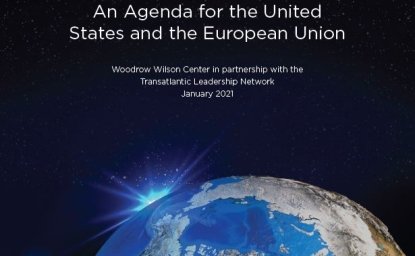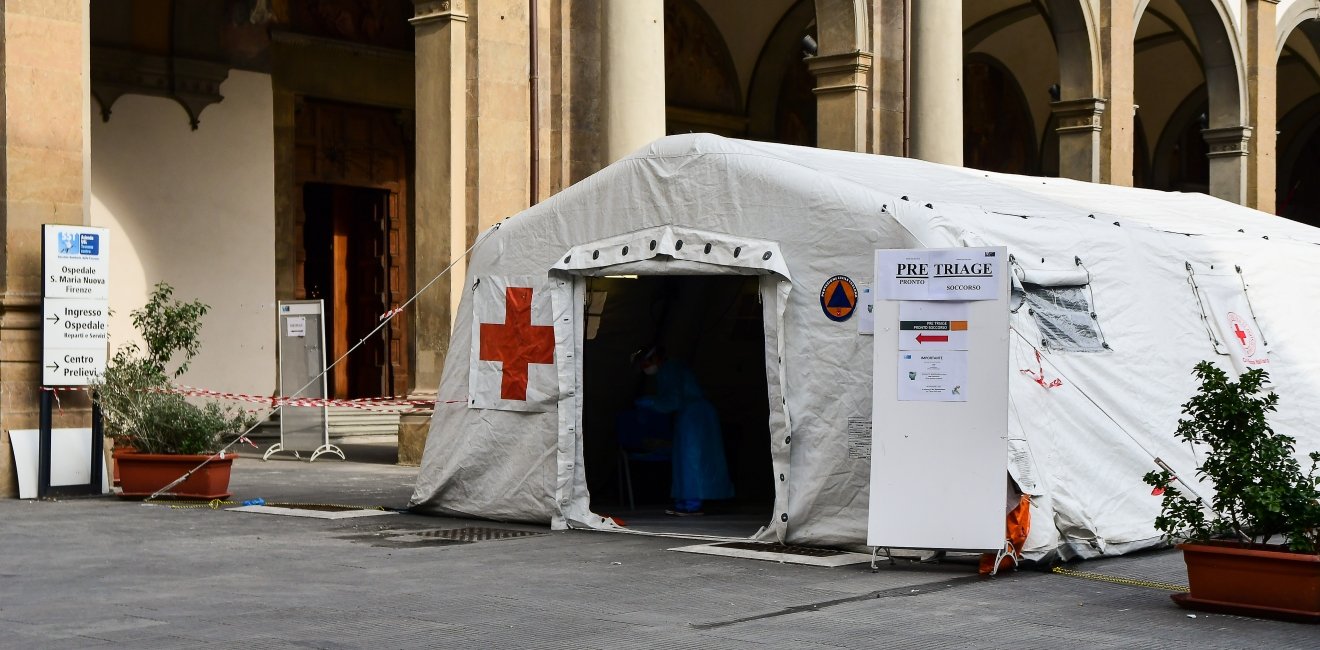This article is part of a series of papers that resulted in the new report:
First Resort: An Agenda for the United States and the European Union
COVID-19 has illustrated how quickly infectious diseases spread across the globe. The pandemic has invoked an unprecedented economic crisis and adversely affected global institutions. Both the European Union (EU) and the US have been hit hard by the pandemic, in terms of infection and death rates as well as in economic terms. The World Health Organization (WHO) formally declared the COVID-19 epidemic a Public Health Emergency of International Concern (PHEIC) on 30 January 2020. A PHEIC is defined as a serious and sudden international public health risk that requires a coordinated international response. In the beginning of 2021 the US was nearing 20 million reported infections and more than 350,000 deaths, more than in any recent war and in any other country. For the EU, European Economic Area (EEA), and the United Kingdom (UK) combined there have been 17.5 million reported infections and 430,000 deaths.
On 12 March 2020 the US closed its borders to EU citizens without notifying EU institutions or member states. The two economic blocs competed over obtaining medical supplies needed in hospitals and EU member states resisted US takeovers of strategic companies, such as the German vaccine developer CureVac, which was allegedly asked by President Trump to move its R&D activities to the US (Dams 2020). The COVID-19 pandemic moreover deepened the divides among world powers, notably between China and the US, and in societies with regard to preferred policy responses (Gaub and Boswinkel 2020). With the Biden Administration in place, the US has shifted its stance on international cooperation and rejoined the World Health Organization (WHO) that the Trump Administration announced to exit in the summer of 2020. In this short paper we discuss COVID-related societal challenges and options for stepping up transatlantic cooperation in the field of global health. We look specifically at societal implications, global health governance and the implications of vaccine nationalism.
Societal implications: Divides over social distancing policies, disinformation and social unrest
The COVID-19 crisis illustrates how an authoritarian approach to tackling pandemics compares to a liberal democratic approach that balances freedom of movement, freedom of speech and privacy with public health objectives. Some democracies have copied Chinese-style lockdown measures, but many have refrained from doing so because of the immediate economic damage and breach of civil liberties and human rights it entails. Nevertheless, also in traditional liberal democracies, measures have been implemented that were long considered unthinkable, such as obligatory curfews, mandatory facemasks and the closure of economic activities.
The pandemic has highlighted divisions. EU member states have been adopting a variety of different lockdown and social distancing policies, and in the US local governors and mayors have imposed more stringent lockdown policies than those advocated by the federal government. The reverse may now occur under the new Biden Administration, which is promoting more prudent COVID-19 measures, such as wearing facemasks in public transport. On both sides of the Atlantic, we have seen disinformation, distrust, conspiracy theories and polarization in societies, fueled by what is known as the COVID-19-infodemic (Buchanan 2020). Mental health among young adults is increasingly an issue of concern.
The COVID-19 pandemic has furthermore laid bare structural weaknesses in the domestic public health systems in place in the US and EU member states. In the US the debate and implementation on Patient Protection and Affordable Care Act (‘Obamacare’) will undoubtedly continue. In the EU there will be an intense debate on how to shape a European Health Union, including an increased mandate at the European level to govern essential public health functions and the response to the public health crisis (EC 2020). At the same time there will be discussion to what extent there should also be a shared European mandate to govern and finance health systems, which remains up to now a member states’ competence (Van Schaik and Van de Pas 2020).
Global health governance in search of rescue and reform
In July 2020, President Trump announced the US intent to leave the World Health Organization (WHO) because it considered the latter too lenient to China’s initial response to the COVID-19 outbreak. To the contrary, EU member states and EU institutions increased their support for the WHO, despite also being critical of China’s handling of the pandemic (Van Schaik et al., 2020). The Singaporean diplomat Mahbubani has been very critical of the neglect by the West of this UN agency, which has suffered from other global organizations trespassing on its mandate and its core budget being frozen since the 1980s (Mahbubani 2013). Until recently the EU never had a strong position on the WHO, thereby implicitly accepting the gradual weakening of the organization (Bergner, Van de Pas et al. 2020).
Then President-elect Biden announced on twitter that the US would re-join the WHO on his first day in office, which he did and the US has now also joined the vaccines sharing facility COVAX by pledging $4 billion US dollars in support. Nevertheless, it will still be challenging to avoid Sino-US rivalry preventing substantive and substantial WHO reform from being pursued. Both the EU and US must also consider how commercial pharmaceutical and domestic security interests are weighted against greater possibilities for developing countries to access medical treatment. In this respect, the conditions under which the US joins the COVAX facility, including on positions vis-à-vis patent sharing and tied allocations of program funding, may be the litmus test for its international credentials in vaccine sharing.
The EU and US are likely to team up in the reform debate of the WHO and should pursue a new transatlantic agenda for cooperation in global health. They are likely to be in favor of amending the International Health Regulations (IHR) that are meant to curb infectious diseases. They will propose a system that can have more leverage to detect new outbreaks early on by allowing action already when medical experts report on new diseases or outbreaks, something which is likely to be opposed by China and other countries, who consider the WHO should first consult with national authorities. Experts linked to the Global Outbreak Alert and Response Network (GOARN) could be tasked as independent inspectors entering a country when a potential new infectious disease is reported upon. Setting up a new Pandemic Treaty may be on the table as options going forward in this respect.
It is not clear yet if and how the Obama-initiated Global Health Security Agenda, that supported capacities to detect and handle outbreaks of infectious diseases, would be continued. This partnership, which includes 64 countries, can be considered to somewhat sideline similar WHO-led efforts, including efforts to implement the IHR. A review of the IHR in 2015 indicates that only a third of countries met the core capacities of public health systems to be prepared for and respond to public health emergencies. Interestingly enough EU countries and the US came out quite well in this review, whereas their health systems arguably endured a hard time during the current pandemic, which also indicates the limits of the IHR. Nevertheless, the pandemic made clear that efforts such as these pursued under the GHSA are still badly needed and need funding to be implemented in many parts of the world, and there are now many more experiences and lessons that can be shared.
A fundamental problem is that the WHO has been chronically underfunded with a budget of a medium seized hospital and its financial reform has remained in gridlock. This has left the organization for a part dependent on funds by philanthropic foundations, such as the Gates Foundation and the Welcome Trust. Most of its funding comes from voluntary contributions by its member states and others. The COVID-19 pandemic provides the ideal political momentum for agreeing on a new funding and financial governance model. Key should be an amendment to the zero growth policy that has frozen WHO’s assessed contributions since the 1980’s.
What is furthermore lacking, is a clear stance on WHO’s regional structure, engagement with non-state actors and its mandate on other global health challenges, now overshadowed by the pandemic. For the EU this involves its collaboration with the WHO European regional office. It is therefore important to include this partnerships in a united, effective and inclusive European strategy for public and global health, as is foreseen in the development of a European Health Union, including a stronger mandate for the European Centre for Disease prevention and Control (Von Der Leyen 2020) (Council 2020) This likewise applies to the US and its collaboration with the regional Pan-American Health Organization (PAHO) and the US Centers for Disease Control and prevention.
When considering reform of the WHO, it would be good to simultaneously take a broader look and offer proposals on how to reform and finance health systems (Soucat and Kickbusch 2020). Health security depends upon properly functioning and accessible health systems with a skilled, available workforce, for which domestic and international investments are currently far below estimated needs (Stenberg, Hanssen et al. 2019). Health workers, especially nurses and midwives, in many countries are relatively underpaid, ageing and overworked. Many want to leave the sector (al-Hussein 2021). At the same time there is a global shortage of 18 million health workers while demand for health care is growing rapidly in ageing societies. So even beyond the stretch now imposed by the pandemic it seems logical to consider a bigger investment to bolster health systems and work force, perhaps referring to this as a “white new deal”. This could also address unemployment concerns in the COVID-19 aftermath.
Cooperation in the field of vaccines, or rather going it alone?
Both the EU and the US are accused of vaccine nationalism with little awareness of the need for other parts of the world to obtain access to vaccines too. China, Russia and India are quickly filling the void in offering a perspective to vaccines to countries currently not have being able to purchase them yet. The EU has been catalytic in setting up the COVAX facility that is backed up by WHO, GAVI and CEPI. Both the EU and US have domestic production of vaccines, and have invested heavily in their development. However, currently they are not open for discussions on relaxing Intellectual Property Rights (IPR) or Compulsory Licensing to enable faster production at potentially cheaper production facilities, so that larger parts of the worlds’ populations can be vaccinated quickly. They clearly protect their pharmaceutical industries and are afraid that a relaxation of IPR would set a precedent for other medical technologies and thereby undermine (future) R&D investments in COVID-vaccines that are effective with different variants of the virus and vaccines and medicines for other diseases.
The EU and the US moreover claim that existing flexibilities to IPR are already sufficient. Recently, South-Africa and India called for a COVID-19 Waiver on certain provisions of the WTO/TRIPS agreement, but found a complete lack consensus in the TRIPS Council. There has been a stalling of the multilateral negotiations on global governance of intellectual property regimes since the Doha Declaration on TRIPS and Public Health from 2001. More specific provisions on IPR for medicines were included in bilateral and regional trade agreements, but these agreements are believed to favor the pharmaceutical industry in high-income countries. The WHO has been largely excluded from protecting (public) health interests vis-à-vis trade and commercial interests.
That being said, the Moderna and BioNtech/Pfizer vaccines, approved and now widely applied domestically in the EU and US, are less attractive for developing countries, due to the cold-chain requirements. Several other COVAX vaccine candidates that may be more suitable to use in developing countries still wait approval. In the meantime, the African CDC has announced that it aims for a 60% vaccination coverage rate in Africa by the end of 2022. China has indicated that it will make the SinoVac vaccine widely available to Africa at an affordable price (Edwards 2021). The Covax vaccine pillar is part of a larger effort, the Access to COVID-19 Tools (ACT) Accelerator. This international platform also considers the diagnostics, therapeutics and health systems that are needed to treat COVID-19. These 3 pillars, especially the health systems, remain considerably underfunded. In January the ACT-Accelerator had a $27.2 billion US dollars funding gap. This gap relates to the more general discussion on how the EU, the US, but also other influential actors such as the Gates Foundation, Welcome Trust and World Bank view the relationship between specific disease control actions and the need to ensure sustainable financing of adequate health systems that can provide universal coverage and essential public health functions, whether it be during a pandemic or beyond. .
Topics and recommendations for US-EU cooperation in improving global health governance
The credibility of the EU and US will hinge upon their ability to tackle the COVID-19 pandemic at home. Extensive and innovative policies are needed in the fight against detrimental disinformation that fuels vaccine hesitancy. Beyond that, structural improvements of health systems and their financing will be needed. The EU and the US have to restore confidence in the ability of liberal democracies to overcome the crises caused by the pandemic. With regard to the COVID-19 response in many other parts of the world, in order to restore legitimacy and trust, they should step up their efforts. Here we list a number of recommendations:
- On top of their COVAX commitments, the EU and US should make efforts to reach and finance a proper multilateral agreement on access to COVID-19 technologies as a global public good. In this respect they could follow the principles established in WHO’s COVID-19 technology access pool (WHO 2020).
- The EU and US should provide dedication, including finance, to all 3 pillars of the ACT Accelerator, as the global COVID-19 health system preparedness and response is considerably more complex than the provisions of vaccines alone.
- The EU and the US should reconsider their approach to IPR of medicines and vaccines. The COVID-19 pandemic provides the momentum to re-establish negotiations on a multilateral, WHO-facilitated treaty that would delink the costs of R&D from end prices to promote access to good health for all, as has been proposed by others (Mazzucato 2020).
- The EU and US should support ongoing efforts to review, reform and amend the WHO’s International Health Regulations (IHR), including on its mandate and sanction possibilities, an expanded role of non-state actors and independent inspectors via the Global Outbreak Alert and Response Network (GOARN). They should also support calls for a more differentiated modality of declaring a PHEIC since the current system is rather rigid.
- The EU and US should reconsider how they will use the Global Health Security Agenda (GHSA) which currently operates on the basis of a strategy for the period 2020-2024 that was decided upon ahead of the COVID pandemic (GHSA 2020). More funding is needed to build and sustain capacities that could either be spent through the GHSA or WHO IHR implementation channels.
- The US and EU should undo the freeze of WHO’s assessed contributions that is in place since the 1980s. They could propose a new percentage of mandatory assessed contributions which would render the WHO more autonomous in fulfilling its function facilitating and coordinating global health norms (see for an overview of different options Reddy, Mazhar et al. 2018).
- The US and EU could support and lead a ‘white new deal’, which would include a global investment plan for health and youth employment, including for low-income countries. This would not only address health security needs, but at the same time counter youth unemployment and spur economic recovery in the wake of the COVID-pandemic. For such an agenda to have impact and be sustainable, there should be agreement with International Financial Institutions (WB, IMF, EIB, etc.) on the macro-economic conditions and the fiscal flexibilities required to render such a massive public investment in the health workforce possible (see also: van de Pas 2020).
- Both the EU and US will have to develop a new global health strategy and define their separate, as well as, joint collaboration to global health objectives and diplomacy, including via platforms such as the G7, the G20, including its Global Health Summit organised in May 2021 by Italy, United Nations Security Council, WHO, and regional investment treaties. In these efforts it is important to consider global health risks in relation to other global challenges such as armed conflict, refugee movements, income inequalities, financial instability, governance of the digital commons, climate change and ecological degradation that have a direct and indirect impact on people’s and planetary health. Improving global health security is intrinsically linked to providing human security, respecting the planetary boundaries and a rapid transformation to a circular and sustainable economic system.
Authors



Global Europe Program
The Global Europe Program is focused on Europe’s capabilities, and how it engages on critical global issues. We investigate European approaches to critical global issues. We examine Europe’s relations with Russia and Eurasia, China and the Indo-Pacific, the Middle East and Africa. Our initiatives include “Ukraine in Europe”—an examination of what it will take to make Ukraine’s European future a reality. But we also examine the role of NATO, the European Union and the OSCE, Europe’s energy security, transatlantic trade disputes, and challenges to democracy. The Global Europe Program’s staff, scholars-in-residence, and Global Fellows participate in seminars, policy study groups, and international conferences to provide analytical recommendations to policy makers and the media. Read more

Explore More
Browse Insights & Analysis
First Resort: An Agenda for the United States and the European Union

Innovación y desafíos en la lucha contra el cáncer con el Dr. Rafael Sánchez en Tres Respuestas


